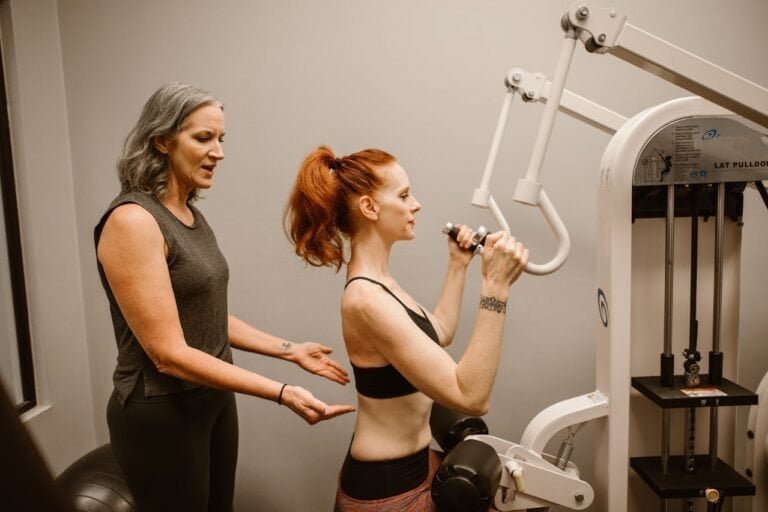At 41, I began noticing the subtle signs of perimenopause: brain fog, joint pain, night sweats, acne, and irregular periods.
While I discussed contraceptive pills and hormone replacement therapy (HRT) with my doctor, I also wanted to explore natural, holistic options to manage symptoms and ease the transition. After a lot of research, I realized how crucial hormonal regularity is, and I don’t want to dismiss these changes as “just part of aging” and find a way to make my symptoms a bit more manageable.
In this article, I’ll share the best perimenopause supplements that are supported by actual research, not only marketing. Although I do understand that supplements can not replace HRT, I’m hoping that some of them can help a bit. My focus is on ingredients with proven benefits for common perimenopausal symptoms like irregular periods, mood swings, brain fog, and hormonal fluctuations.
While many perimenopause supplements flood the market with bold claims, only a few have solid data behind them.
We all experience perimenopause differently, and the severity of symptoms can vary. If symptoms are affecting your quality of life, it’s worth taking them seriously rather than brushing them off as “normal.” So, please consult your healthcare provider before you decide to try supplements.
What Are The Most Common Perimenopause Symptoms?

Although there are over 100 reported symptoms, the most common ones include:
Vasomotor symptoms – hot flashes and night sweats
Changes in periods – they can get longer, shorter, unpredictable, heavier, or more painful
Brain fog and headaches – often reported together
Skin and hair changes – acne, thinning hair, dryness, or loss of elasticity
Body changes – increased belly fat and joint pain are common
Reduced libido – many women report decreased sexual desire
Best Perimenopause Supplements
A list of the best perimenopause supplements that may help with common symptoms, according to research:
Soy Isoflavones
Multiple randomized trials and systematic reviews show that soy isoflavones can significantly improve somatic (e.g., hot flashes, fatigue, joint pain) and psychological (e.g., mood, depression) symptoms in perimenopausal women, with improvements ranging from 19% to 42% over 12 weeks (14). Meta-analyses show a reduction in hot flash frequency and severity by about 20–26% compared to placebo (15), though some studies find no significant benefit.
Vitex (Chaste Tree Berry)
Vitex is well-studied for PMS and shows promise for perimenopausal symptoms like mood swings, anxiety, and hot flashes. It may work by modulating prolactin via dopaminergic activity and has mild phytoestrogenic effects, potentially helpful in low-estrogen states (1).
Shatavari (Asparagus racemosus)
A recent small study of 50 perimenopausal women (40–50 years old) found that taking Shatavari for 4 months reduced hot flashes and mood changes, eased menstrual cramps, improved hormonal balance (lower FSH and LH, higher AMH), and even benefited skin and hair – all without side effects (2). The study was company-funded but still promising.
Black Cohosh
Research on black cohosh is mixed: some studies show relief in hot flashes and night sweats (8), while others find no significant difference (3). It remains one of the most studied herbal options for vasomotor symptoms.
Fenugreek Extract
Randomized, placebo-controlled trials show that 500 mg/day for 42 days can reduce hot flashes (by 26%), night sweats (27%), depression (32%), and insomnia (~22%) (9). Other studies also note improved sexual function and mood (10). Fenugreek may help restore hormonal balance by increasing estradiol, testosterone, and progesterone, while reducing FSH and SHBG (11).
Ashwagandha
Ashwagandha has been shown to improve sleep quality and reduce insomnia in perimenopausal women (12). It may also help with hot flashes and mood changes, though most studies use herbal combinations, so results are less conclusive (13).
If you’re interested in choosing a clean, high-quality product, you can read: Best Ashwagandha Supplements with Clean Ingredients to Buy in 2025.
Evening Primrose Oil
Evening Primrose Oil (EPO) may be more effective for night sweats than hot flashes. Some studies show reduced frequency and severity of night sweats (16) and improvements in mood, irritability, and anxiety (17).
Red Clover Isoflavones
Red clover may reduce hot flash frequency and severity, though results vary. A 2021 meta-analysis found about 1.7 fewer daily hot flashes with supplementation, especially at higher doses and longer treatment durations (≥12 weeks) (18).
Herbal supplements are far less regulated than medications, so it’s important to research brands, ingredient quality, and dosage. They also take time to work – give them 2 to 3 months before judging results.
Other Supplements To Help With Perimenopause Symptoms
Beyond symptom-specific supplements, it’s important to support your overall health with nutrients many women in their 40s benefit from:
Vitamin D3 + K2 – supports bone health, hormone regulation, and menstrual regularity (4)
Creatine (3–5 g/day) – supports muscle maintenance and brain function. You can read more about the benefits of creatine here.
Magnesium Glycinate – especially useful for sleep and stress if you exercise or sweat often
Vitamin B12 – essential for those on plant-based diets
Iron – heavy bleeding during perimenopause can lead to deficiency or anemia; supplementation can improve cognitive symptoms (6)
For painful cramps, there are potential benefits from fenugreek, ginger, valerian, thyme, zinc sulphate, omega 3, and vitamin B1 (5).
Lifestyle Changes That Support Perimenopause

No supplement works in isolation. Healthy lifestyle habits make the biggest difference during this stage.
Nutrition: Prioritize minimally processed foods, antioxidants, high-quality protein, and plenty of fruit, vegetables, and soy products.
Sleep: Create a wind-down routine, avoid eating close to bedtime, and protect sleep quality.
Exercise: Focus on weight and strength training to maintain muscle and bone density.
Stress management: Build recovery time into your day and avoid overtraining – the body needs longer recovery after intense workouts (7).
If you want to learn more about lifestyle changes to support perimenopause, read:
What I Changed in My Routine as a 40-Year-Old Woman to Feel My Best
To Summarize
The is no one perimenopause supplement that can regulate cycles or address all perimenopausal symptoms. However, Shatavari, Black Cohosh, and Vitex show the most promise for symptom relief and possible cycle regulation. Results can vary, and more research is needed.
Test supplements thoughtfully and give them time – it can take at least two months to notice changes. I’ve been taking Vitex and recently added Shatavari. I’ll share updates on whether they help regulate my cycle and ease symptoms.
Perimenopause is not just a challenge but a transition that deserves awareness and self-care. Lifestyle, nutrition, and well-chosen supplements together can make this phase much smoother.
Please note: This post is for informational purposes only and is based on research. It’s not medical advice. Always consult a healthcare professional before taking any supplements or making changes to your routine.
Perimenopause supplement studies references
1. Van Die, M., Burger, H., Teede, H., & Bone, K. (2009). Vitex agnus-castus (Chaste-Tree/Berry) in the treatment of menopause-related complaints.. Journal of alternative and complementary medicine, 15 8, 853-62 . https://doi.org/10.1089/acm.2008.0447.
2. Yadav, P., Yadav, S., Vedururu, S., & Kumari, G. (2025). A Standardized Asparagus Racemosus Root Extract Improves Hormonal Balance and Menstrual Health and Reduces Vasomotor Symptoms in Perimenopausal Women: A Randomized, Double-Blind, Placebo-Controlled Study.. Journal of the American Nutrition Association, 1-11 . https://doi.org/10.1080/27697061.2025.2510474.
3. Peng, J., Xu, W., Li, X., & Wu, Q. (2020). [Efficacy of black cohosh extracts for improving low estrogen status induced by postoperative GnRHa treatment in patients with endometriosis: a systematic review].. Zhejiang da xue xue bao. Yi xue ban = Journal of Zhejiang University. Medical sciences, 49 3, 397-405 . https://doi.org/10.3785/j.issn.1008-9292.2020.03.16.
4. Muthukumaran, D., Jumah, J., Shanmugam, R., & Kamaraj, C. (2025). From Sunshine to Wellness: Understanding Vitamin D Impact on Menstrual Health. Advances in Public Health. https://doi.org/10.1155/adph/5296320.
5. Pattanittum, P., Kunyanone, N., Brown, J., Sangkomkamhang, U., Barnes, J., Seyfoddin, V., & Marjoribanks, J. (2016). Dietary supplements for dysmenorrhoea.. The Cochrane database of systematic reviews, 3, CD002124 . https://doi.org/10.1002/14651858.cd002124.pub2.
6.Choi, M., Seiger, E., & Murray-Kolb, L. (2025). Cognitive Function in Peri- and Postmenopausal Women: Implications for Considering Iron Supplementation. Nutrients, 17. https://doi.org/10.3390/nu17111762.
7. Vohra, A. (2025). Integrated Nutritional Approaches for Hormonal Modulation During the Perimenopausal Transition. International Journal of Innovative Science and Research Technology. https://doi.org/10.38124/ijisrt/25jun1773.
8.Castelo-Branco, C., Navarro, C., Beltrán, E., Losa, F., & Camacho, M. (2022). Black cohosh efficacy and safety for menopausal symptoms. The Spanish Menopause Society statement. Gynecological Endocrinology, 38, 379 – 384. https://doi.org/10.1080/09513590.2022.2056591.
9. Khanna, A., John, F., Das, S., Thomas, J., Rao, J., Maliakel, B., & Im, K. (2020). Efficacy of a novel extract of fenugreek seeds in alleviating vasomotor symptoms and depression in perimenopausal women: A randomized, double-blinded, placebo-controlled study.. Journal of food biochemistry, e13507 . https://doi.org/10.1111/jfbc.13507.
10.Khanna, A., Thomas, J., John, F., Maliakel, B., & Krishnakumar, I. (2021). Safety and influence of a novel extract of fenugreek on healthy young women: a randomized, double-blinded, placebo-controlled study. Clinical Phytoscience, 7, 1-12. https://doi.org/10.1186/s40816-021-00296-y.
11.Zhang, F., & Yang, D. (2025). A Meta-Analysis: Anti-Inflammatory Medicinal Plants for Age-Related Menopause-Like Symptoms and Psychological Problems in Breast Cancer and Healthy Perimenopausal Women.. BJOG : an international journal of obstetrics and gynaecology. https://doi.org/10.1111/1471-0528.18209.
12. Potocka, Z., Borycka, A., Jędrzejewska, B., Kotulska, M., Laskus, P., Lichman, M., Lubczyńska, Z., Przeradzki, J., & Rząd, K. (2023). Potential clinical usage of ashwagandha root extract: A review. Journal of Education, Health and Sport. https://doi.org/10.12775/jehs.2023.29.01.004.
13. Choudhury, R., Coelho, K., Suryawanshi, S., Hajare, A., & Kumar, A. (2025). Effectiveness of Multisymptom Support for Better Relief and Alleviation of Common Effects in Perimenopause (EMBRACE PERIMENOPAUSE). Cureus, 17. https://doi.org/10.7759/cureus.86091.
14. Khapre, S., Deshmukh, U., & Jain, S. (2022). The Impact of Soy Isoflavone Supplementation on the Menopausal Symptoms in Perimenopausal and Postmenopausal Women. Journal of Mid-Life Health, 13, 175 – 184. https://doi.org/10.4103/jmh.jmh_190_21.
15. Taku, K., Melby, M., Kronenberg, F., Kurzer, M., & Messina, M. (2012). Extracted or synthesized soybean isoflavones reduce menopausal hot flash frequency and severity: systematic review and meta-analysis of randomized controlled trials. Menopause: The Journal of The North American Menopause Society, 19, 776–790. https://doi.org/10.1097/gme.0b013e3182410159.
16.Kazemi, F., Masoumi, S., Shayan, A., & Oshvandi, K. (2021). The Effect of Evening Primrose Oil Capsule on Hot Flashes and Night Sweats in Postmenopausal Women: A Single-Blind Randomized Controlled Trial. Journal of Menopausal Medicine, 27, 8 – 14. https://doi.org/10.6118/jmm.20033.
17.Ghavi, F., Shakeri, F., Farahnaz, H., & Abdolahian, S. (2023). Comparison of the Effect of Fennel and Evening Primrose Oil on Menopausal Problems and Hormonal Levels: A Randomized Controlled Trial. Iranian Journal of Nursing and Midwifery Research, 28, 430 – 435. https://doi.org/10.4103/ijnmr.ijnmr_149_22.
18. Kanadys, W., Barańska, A., Błaszczuk, A., Polz-Dacewicz, M., Drop, B., Kanecki, K., & Malm, M. (2021). Evaluation of Clinical Meaningfulness of Red Clover (Trifolium pratense L.) Extract to Relieve Hot Flushes and Menopausal Symptoms in Peri- and Post-Menopausal Women: A Systematic Review and Meta-Analysis of Randomized Controlled Trials. Nutrients, 13. https://doi.org/10.3390/nu13041258.
Silvija Meilunaite, PN1-NC, CSMC, is a certified nutrition and menopause coaching specialist who writes about midlife health, nutrition, and evidence-based wellness. She focuses on research-driven approaches to feeling better in your 40s and beyond, with a special interest in low-tox living and supportive daily habits.




Cool blog.